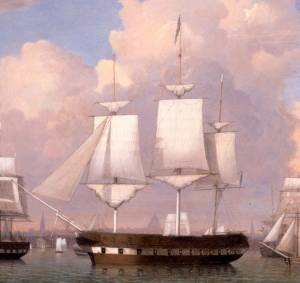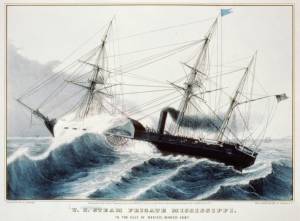An online project under the direction of the CAPE ANN MUSEUM
Historical Materials: Vessel Types
Historical Materials » Vessel Types » Naval / Government Vessel
You have navigated to this pages from catalog entry: American Vessels No. 1, c.1845 (inv. 452)
Naval / Government Vessel
View related Fitz Henry Lane catalog entries (6) »
Government-owned vessels were mainly concerned with defense of the nation (i.e. the U.S. Navy), the regulation of foreign commerce via enforcement of tariffs and seizure of contraband (i.e. the U.S. Revenue Service), and aids to navigation (i.e. the U.S. Lighthouse Service; coastal life-saving was in the hands of civic organizations).
Naval vessels were classified according to a multitude of duties, which in turn determined hull form and size, propulsion (sail, engine-powered, oars), and numbers and duties of crews.
Revenue service vessels varied from small harbor craft, swift-sailing schooners for coastal and harbor patrols, and large square-rigged (and later engine-powered) ships for off-shore duty. These vessels worked closely with customs houses in seaports with significant foreign commerce.
Related tables: Ship (Full-Rigged) »
Hand-colored lithograph
Published by N. Currier, New York
Library of Congress catalog number 93514426
Also filed under: Currier (& Ives) – New York »


